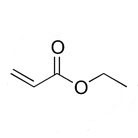What is Ethyl Acrylate?
Ethyl acrylate is a clear and volatile liquid that is slightly soluble in water and completely soluble in alcohols, ethers and almost all organic solvents. It is a very flammable liquid (fire hazard rating 3) with a flashpoint of 16° C and has a sharp acrid odour.

Technical Properties
Technical properties of ethyl acrylate:
Cas Number: 140-88-5
Chemical Formula: C5H8O2
Synonyms: Acrylic acid ethyl ester, ethyl propenoate and ethyl prop-2-enoate
Molecular Mass: 100.12 g/mol
Flashpoint (open cup): 60 °F / 16 °C
Autoignition temperature: 653 °F / 345 °C
Boiling Point: 210 °F / 99 °C
Melting Point: -96 °F / -71 °C
Density: 0.92 g/mL
How is it produced?
Ethyl acrylate can be chemically manufactured using several industrial methods. The most prominent method is to cause a reaction between acrylonitrile and ethanol using sulphuric acid as the catalyst. Additionally, manufacturers may also use phenollic type inhibitors, soluble manganese or cerium salts to aid its production. Other chemicals used in this reaction are acetylene, carbon monoxide and ethanol.
How is it stored and distributed?
A chemical distributor would have a bulk storage facility to maintain the chemical’s stability. Storage should be in a cool, dry, well-ventilated facility that is out of direct sunlight. The acrylate should also be kept separate from oxidisers, polymerises and strong alkalisers.
Ethyl acrylate would normally be distributed by a solvent exporter in bulk vessels or tank trucks. For transportation purposes, ethyl acrylate is classed as a flammable liquid as it has a fire hazard rating of 3. This compound contains an inhibitor (hydroquinone) to stabilise it during transportation and stop polymerisation.
Health hazards
Ethyl acrylate is rated a 2 for a health risk under the NFPA 704, indicating intense or continued use could cause a temporary incapacitation or residual injury with the potential for contact to burn the skin and eyes. If the compound is breathed in, the lungs can be irritated and cause coughing and shortness of breath. For these reasons, appropriate protection equipment including protective clothing and eye protection should be always worn while handling the chemical.
The acrylate is possibly carcinogenic to humans, especially for colorectal cancer, although the evidence has been inconclusive so far. As a result of animal studies indicating the possible link, ethyl acrylate is no longer authorised to be used as a food additive by the FDA. Therefore, foods in the US should only contain this compound if it occurs naturally in the product such as pineapples and some cheeses.
Ethyl acrylate allergies
Individuals can be allergic to ethyl acrylate, often discovered when they use artificial nails, dentist materials and various adhesives. This results in contact dermatitis; a red, itchy rash that can be uncomfortable, although is not contagious or life-threatening.
A patch test performed by a clinician can be used to test for an ethyl acrylate allergy. If you are allergic, you will be advised to read product labels carefully to avoid contact as well as to test new products on a small skin area.
Ethyl acrylate uses
Ethyl acrylate is primarily used in the production of emulsion-base polymers. Manufacturers produce acrylic resins which can then be used as paints, coatings, or latex products. It is mainly used in polyacrylate elastomers, acrylic rubber, textiles, acrylic fibres, leather products and denture materials. It can be used as a coating on most household items such as books, magazines, frozen food packaging, as a fragrance additive and as an adhesive for envelopes and labels. The primary end user markets are the plastics, leather, paints, packaging, paper, and textiles industries.
Solventis as your Ethyl Acrylate Supplier
Solventis is a leading bulk supplier and distributor of ethyl acrylate in the UK, Europe and globally. As a company with offices in the UK and Belgium, we are proud to be able to offer a personal and efficient service, together with highly competitive prices.
As a result of our state-of-the-art facility in Antwerp, Belgium, we can guarantee the quality, efficiency, safety, and environmental awareness for our whole range of products that is second to none. Please contact us for more information on our ethyl acrylate or any acrylate from our range on our enquiry form or by phone on +44 (0)1483 203224.



